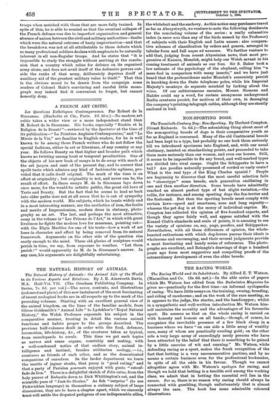THE NATURAL HISTORY OF ANIMALS.
The Natural History of Animals : the Animal Life of the World in its Various Aspects and Relations. By J. R. Ainsworth Davis, M.A. Half-Vol. VII. (The Gresham Publishing Company. In Series, '7s. 6d. per vol.)—The cover, contents, and illustrations (coloured and plain) of this new instalment of the most fascinating of recent zoological books are in all respects up to the mark of the preceding volumes. Starting with an excellent general view of the animal kingdom, on the lines of the familiar models, from Oliver Goldsmith's "Animal Life" to Lydekker's "Royal Natural History," the Welsh Professor expounds his subject in the comparative manner, treating in detail the various animal functions and habits proper to the groups described. The previous half-volumes dealt in order with the food, defences, locomotion, life-history, &c., of the creatures taken as typical, from camelopards to corals. This time we get such topics as nerves and sense organs, courtship and mating, with a well-condensed notice of that endless story, animal in- telligence and instinct, besides utilitarian zoology, —i.e., creatures as friends of each other, and as the domesticated companions of ourselves. In the larder department we learn the merits of jaguar steaks, that pussy is "good eating," and that a party of Parisian gourmets enjoyed with gusto " estouf- fade de lion." There is a delightful sketch of Felis catus, from the holy purrer of Bnbastis down to Dick Whittington's cat, and the scientific puss of "Just-So Stories." As fish "surprise" (to use Pick-wickian language) in themselves a culinary subject of large dimensions, they are to have a chapter apart, which we sincerely trust will settle the disputed pedigrees of our indispensable allies, the whitebait and the anchovy. As this notice may perchance travel as far as Aberystwyth, we venture to note the following desiderata for the concluding volume of the series : a really exhaustive index (a rarer atria than any of the birds named by the Professor) of subjects with their English and Latin names : also compara- tive schemes of classification by orders and genera, arranged in tabular form and full aqua ad nauseam. We further venture to add that, judging from recent Abyssinian news, that most pro- gressive of Kaisers, Menelek, might help our Welsh savant in his coming treatment of animals as our foes. Sir S. Baker took a low estimate of the psychology of the elephant, calling him "a mere fool in comparison with many insects," and we have just heard that the proboscidean.s under Menelek's suzerainty persist in knocking down the State telephone poles, while his Imperial Majesty's monkeys do separate mischief by lurking about the wires. Of our subterraneous enemies, Messrs. Siemens and Halske could say a word, for certain anonymous underground Berlin creatures persist, for motives of their own, in damaging the company's printing-telegraph cables, although they are stoutly enclosed in lead.






















































 Previous page
Previous page